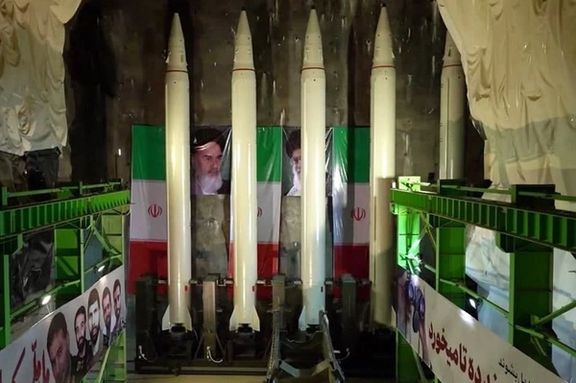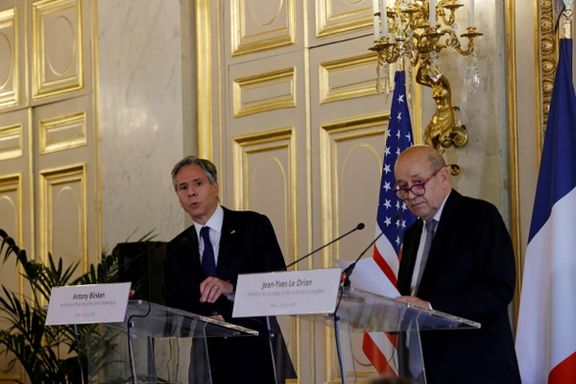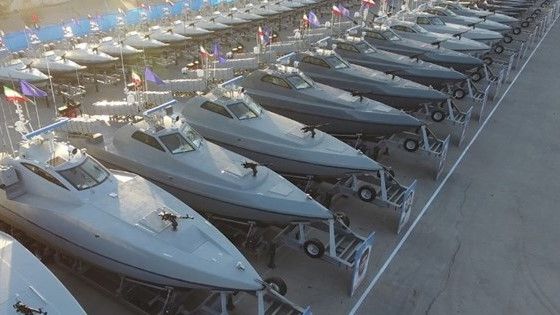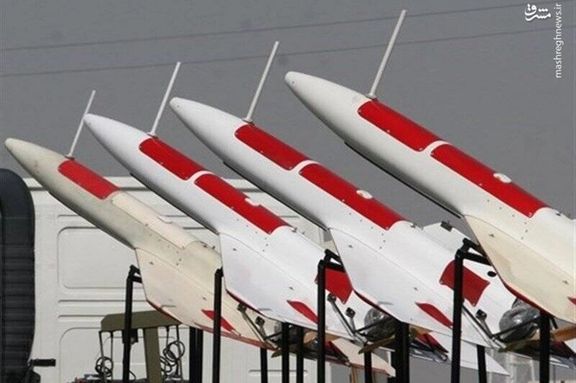Iran Warns Of 'Heavy Price' After Talk Of US-Israeli Military Drills

An Iranian website has quoted a top military official as threatening retaliation with missiles if the United States and Israel attack Iran’s nuclear sites.

An Iranian website has quoted a top military official as threatening retaliation with missiles if the United States and Israel attack Iran’s nuclear sites.
US and Israel this week said they are considering joint military drills to prepare for action against Iran if current nuclear negotiations fail and political leaders decide to act to prevent Tehran from acquiring nuclear weapons.
Nour News close to Iran’s Supreme National Security Council Saturday in a brief report quoted a military official as saying that Iranian commanders would take an attack as an opportunity to test their missiles “on real targets, to extract a heavy price from aggressors who would violate the territory of the Islamic Republic.”
The military official also mentioned the January 8, 2020 ballistic missile attack on the Ain al Asad base in Iran hosting US troops and the concussion more than one hundred US troops received. He said he does not believe these soldiers would be willing to attack Iran.
Israeli officials have been reiterating that if a new nuclear agreement does not block Iran from its path to acquire nuclear arms, Israel has to ensure its security in any way possible, without seeking approval by the United States.

US Secretary of State Antony Blinken on Friday held a "productive" meeting with counterparts from Britain, Germany and France, including a discussion of the Iran nuclear deal.
Talks between Iran and world powers over reviving a 2015 nuclear deal resumed in Vienna on Thursday.
"Secretary Blinken had a productive meeting with his E3 counterparts from Germany, France, and the UK in Liverpool yesterday. They discussed the JCPOA (Joint Comprehensive Plan of Action) talks and our way forward,” a State Department spokesperson said on Saturday.
After months of negotiations earlier this year, Iran’s new hardline government presented new demands in talks last week that led to pessimism over the outcome of diplomatic efforts to revive the JCPOA. The United States and its European allies have warned Iran that there little time left to reach an agreement, given Iran rapid nuclear advances.
The meeting took place in the northern English city of Liverpool on the eve of a G7 foreign ministers' meeting which is expected to result in a joint call for Iran to moderate its nuclear program and grasp the opportunity of talks in Vienna.
Reporting by Reuters

Javan newspaper in Tehran proclaimed Saturday a "positive atmosphere" in Iran’s Vienna talks with world powers, shifting from its previous downbeat reporting.
Under the headline "Vienna Positive, Moving Forward" across its front page, the newspaper, which is affiliated to the Revolutionary Guards (IRGC), wrote that it appeared “the western sides of the Vienna talks have entered the negotiation room from a different door this time and have adopted an approach…different from the past.”
The change had come, the paper noted, with the second round of talks with the new team of negotiators appointed by President Ebrahim Raisi (Raeesi), who took office in August: "Until last week European officials and diplomats leveled accusations against Iran and expressed doubt about reaching an agreement in the talks.”
Javan also claimed Robert Malley, the White House Iran envoy, had “reduced the extent of his attacks." It quoted Malley's remark Fridaythat reviving the 2015 nuclear agreement, Joint Comprehensive Plan of Action (JCPOA), would be the in "mutual interests" of both the United States and Iran.
European and US officials gave pessimistic media briefings after the first week of the resumed talks when Iran presented new written proposals for restoring the deal. The US, which left the JCPOA in 2018 and imposed ‘maximum pressure’ sanctions on Iran, takes part indirectly in Vienna.
A ‘European source’ told Reuters Friday that negotiators were still working on texts discussed five months ago during talks held when President Hassan Rouhani was still in office. According to Reuters’ source, Iran this week agreed to continue talks from where they left off in June – a matter that would be put to the test in “the next couple of days.”
Tasnim news agency, also affiliated with the IRGC, said Friday that Iran’s negotiating stance had not changed in a week, and quoted ‘a source close to the Iranian negotiation team’ that talks were based on Iran's recent proposals.
President Ebrahim Raisi Saturday outlined Tehran's approach in remarks quoted by the official news agency IRNA: "Some people claimed the Islamic Republic would not negotiate, others alleged that we wouldn't be serious in the talks…But the Islamic Republic took part in the talks with dignity and by offering texts demonstrated that it is serious in negotiations… a good agreement is possible if the US is serious about the lifting of its sanctions.”
But Raisi warned that “the enemy's strategy is to always keep the shadow of the sanctions over the Iranian people's heads and to expand it.”
Israeli Defense Minister Benny Gantz said Friday that he had told senior US officials in Washington that Israel considered Iran not only a threat to Israel but "a global problem that requires a global solution." Israel recently allocated $1.5 billion for a military attack on Iran.

Iran launched 110 new navy speedboats in Bandar Abbas at the Strait of Hormuz on Saturday, capable of launching ship-to-ship missiles, the IRGC announced.
Iran’s Revolutionary Guard Navy has hundreds of speedboats produced based on limited naval production capabilities, that are meant to attack and swarm larger enemy vessels. The speed boats have harassed US Navy warship on numerous occasions.
Hossein Salami, the commander of the Revolutionary Guard (IRGC) chaired ceremonies saying that the launch was the seventh time this year new vessels and weapons systems were added to the navy.
Salami said that amid sanctions “we are expanding our defensive power” led by the guidance of Supreme Leader Ali Khamenei. He added that in order to “live free and independent” Iran needs to be powerful. The IRGC commander claimed that if Iran was not powerful, the Muslim countries in the region would have been dominated and destroyed by enemies. He added that Iran is determined “to increase its power on daily basis.”
Critics point out that Islamic Republic’s nuclear and missile programs, as well as its regional adventures have led to international and US sanctions over the years that have impoverished weakened the country.

Contradictory news on Friday surrounding Iran’s nuclear talks set Iranian pundits at home or abroad racing to make sense of what was really happening in Vienna.
News emerged on Friday that Iran was accepting to continue talks based on earlier understanding reached in June, while media in Iran insisted that Tehran stands firm on its new demands.
Analysts in Iran began mentioning that Tehran sees the nuclear negotiations as an issue of lifting sanctions, while it has truned in to a security problem for the world.
An Iranian analyst in Germany, Mehran Barati told the Iran International TV Friday that this could be a negotiating tactic by the Iranian delegation to say that they accept the June 20 draft agreement but have some new additions. These include demands for a continued commitment to the JCPOA by the United States, and verification of US promises, before returning to its commitments under the JCPOA.
Barati said that in the June agreement the United States had accepted to lift 94 percent of the sanctions it has imposed on Iran since 2018 when it withdrew from the JCPOA. The remaining 6 percent was about sanctions related to terrorism and human rights violation and affect Iranian leaders. Barati added that from a legal point of view, the United States cannot lift those sanctions.
He also noted that the Islamic Republic's Supreme Leader Ali Khamenei makes all the decisions about the negotiations and President Ebrahim Raisi and Foreign Minister Hossein Amir-Abdollahian cannot intervene in the matter while Khamenei continues the talks using his relative Ali Bagheri Kani as his proxy.
In the meantime, the Iranian administration-linked semi-official news agency ISNA on Thursday summed up views expressed by Iranian analysts and experts on the future of the Vienna talks after pundits discussed the matter on the audio chat application Clubhouse on Tuesday.
According to ISNA, a foreign policy analyst Ali Montazeri summarized Iran's mistakes in nuclear negotiations during the past 20 years. He said that some domestic political disputes between President Ahmadinejad and then-security chief Ali Larijani also led to the failure of the talks in early 2010s. Montazeri also said that Iranians are frustrated by the high cost of prolonged negotiations that have not solved the country's problems.
Nuclear policy analyst Foad Sadeghi said that during the past 20 years the nuclear talks have been the country's main challenge. "We have paid a high price for it and yet, we are once again at the intersection trying to decide whether to return to our commitments under the JCPOA or to face further sanctions and UN Security Council resolutions." He also said, "Most of what we think are our leverage and bargaining chips, are in fact not justifiable and work against us."
Former diplomat Ghasem Mohebali said that Iran's nuclear program has become too costly for the nation while no one is still able to benefit from it as it has been turned into a security issue against the country. He said until 2009, domestic discussion about the nuclear issue was whether Iran should surrender to the West's demands without anything in return. After that, the problem changed to surrendering to the West's demands for sanctions relief. He said it was a mistake to portray a security problem as an economic challenge. The fact that the JCPOA says that after eight years Iran's nuclear program will be peaceful means that the world has initially perceived Iran's nuclear program as a hostile program.
Another former diplomat Javid Ghorbanoghlou said in the Clubhouse debate: "Iran has never had a defined nuclear strategy backed by the people. This was the main reason why it has been turned into a security issue."

The US House Foreign Affairs Committee Friday passed a bipartisan bill that would ban the supply, sale or transfer of military drones to or from Iran under US law.
The bill was introduced by a group of Republicans and Democrats in late November. The lawmakers behind the proposed legislation (H.R. 6089), the Stop Iranian Drones Act (SIDA), say it clarifies that US sanctions on Iran’s conventional weapons program under CAATSA (The Countering America’s Adversaries Through Sanctions Act) include the supply, sale or transfer to or from Iran of drones.
The draft legislation was presented by House Foreign Affairs Committee Chairman Gregory Meeks (D-NY), Michael McCaul (R-TX), Ted Deutch (D-FL), and Joe Wilson (R-SC) Tuesday.
Iran’s military drone program has expanded in recent years and UAV’s have been more frequently used in attacks in recent months both on land and at sea.
In an interview with the Associated Press on Friday, commander of CENTCOM Gen. Kenneth McKenzie expressed concern over the growing capabilities of Iranian missiles and drones.
“Iran’s UAV proliferation continues to threaten the U.S. and our allies throughout the Middle East. Whether the attack is launched by Iran, the Houthis, Iran-backed militia groups or any other Iran-sponsored entities, these attacks are intolerable,” Rep. McCaul said.